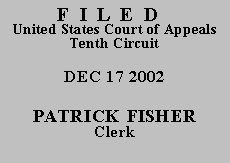 UNITED STATES COURT OF APPEALS
UNITED STATES COURT OF APPEALS
 UNITED STATES COURT OF APPEALS
UNITED STATES COURT OF APPEALS
| BILLY G. HUNTER, | |
| Petitioner - Appellant, | |
| v. | |
| STATE OF OKLAHOMA; BOBBY BOONE, Warden; FRANK KEATING; and PAROLE BOARD OF OKLAHOMA, |
(D.C. No. 01-CV-718-S) (E.D. Okla.) |
| Respondents - Appellees. |
This is a pro se 28 U.S.C. § 2241 appeal brought by a state prisoner. In 1978, Petitioner was convicted of Murder in the First Degree and sentenced to life imprisonment. Petitioner was paroled in 1987, but his parole was revoked on February 7, 1996, after he was charged with Malicious Injury to Property and Rape by Instrumentation. Petitioner was found not guilty of the rape charge on February 15, 1996, and the injury to property conviction was dismissed on November 19, 1998. On June 29, 1999, Petitioner filed for post-conviction relief in the Oklahoma courts.
On July 3, 2000, Petitioner filed a petition for writ of habeas corpus in the United States District Court for the Eastern District of Oklahoma pursuant to 28 U.S.C. § 2254, which this court construed as a petition pursuant to 28 U.S.C. § 2241. See Hunter v. Boone, 13 Fed. Appx. 828, 2001 WL 744978 (10th Cir. July 3, 2001). In the petition, Petitioner argued that he was denied due process in the parole revocation proceeding. He further argued that the revocation was invalid since he was acquitted of the rape charge and since the conviction for injury to property had been dismissed. The record indicates that both charges were considered in connection with his parole revocation.
The state moved to dismiss the petition as time-barred since it was not filed within the one-year statute of limitations in 28 U.S.C. § 2244(d). Petitioner argued that he was entitled to equitable tolling since it took him until November 1998 to have the misdemeanor dismissed. He also argued that the statute should be tolled during his post-conviction proceedings in the Oklahoma courts. The district court dismissed the petition as time-barred. We denied Petitioner's motion for a certificate of appealability, holding that Petitioner had failed to make "a substantial showing of the denial of a constitutional right" pursuant to 28 U.S.C. § 2253(c)(2) and that there were insufficient grounds for equitable tolling. The petition was dismissed.
Petitioner subsequently filed another habeas petition, this time pursuant to 28 U.S.C. § 2241, attacking the revocation of his parole. Respondent moved to dismiss the petition as being second and successive. The district court granted the motion, and Petitioner timely filed this appeal.
In order for this court to grant a certificate of appealability, Petitioner must make a "substantial showing of the denial of a constitutional right." 28 U.S.C. § 2253(c)(2). To do so, Petitioner must demonstrate "that reasonable jurists could debate whether (or, for that matter, agree that) the petition should have been resolved in a different manner or that the issues presented were adequate to deserve encouragement to proceed further." Slack v. McDaniel, 529 U.S. 473, 484 (2000) (quotations omitted).
Petitioner contends that the district court erred in failing to reach the merits of his § 2241 petition in which he alleges that he has been found actually innocent of the alleged misconduct resulting in the parole revocation. However, the merits of these arguments were raised in the original habeas petition and considered by both the district court and this court. Therefore, the current petition is second and successive, and we cannot now reach the merits.
We have carefully reviewed Petitioner's brief, the district court's disposition, and the record on appeal. Nothing in the facts, the record on appeal, or Petitioner's brief raises an issue which meets our standards for the grant of a certificate of appealability. For substantially the same reasons as set forth by the district court in its Order of August 1, 2002, we cannot say "that reasonable jurists could debate whether (or, for that matter, agree that) the petition should have been resolved in a different manner." Id.
We DENY Petitioner's request for a certificate of appealability and DISMISS the appeal.
Entered for the Court
Monroe G. McKay
Circuit Judge
Click footnote number to return to corresponding location in the text.
*. This order and judgment is not binding precedent, except under the doctrines of law of the case, res judicata, and collateral estoppel. The court generally disfavors the citation of orders and judgments; nevertheless, an order and judgment may be cited under the terms and conditions of 10th Cir. R. 36.3.